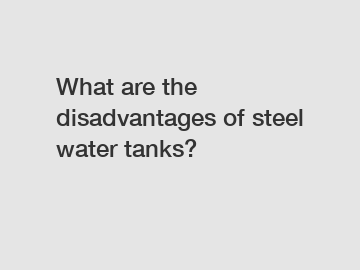What are the disadvantages of steel water tanks?
What are the disadvantages of steel water tanks?
Steel water tanks have been widely used for storing water due to their durability and strength. However, they also come with certain disadvantages that need to be considered. In this article, we will delve into the drawbacks of steel water tanks, their underlying reasons, and the significance of these drawbacks.
One major disadvantage of steel water tanks is their susceptibility to corrosion. Over time, exposure to moisture and various contaminants can lead to the formation of rust on the tank's surface. This corrosion compromises the structural integrity of the tank, making it more prone to leaks and failures. The corrosion process is accelerated in environments with high humidity or aggressive water conditions, such as acidic or saline water.

The presence of rust not only weakens the tank but also affects the quality of the stored water. Iron oxide particles from the rust can contaminate the water, resulting in an unpleasant taste and potential health hazards. Moreover, the accumulation of rust and sediment within the tank may lead to clogging of pipes and other plumbing fixtures, requiring frequent maintenance and cleaning.
Additionally, steel water tanks are known for their relatively high cost compared to other tank materials. The production of steel involves complex processes and the use of expensive raw materials, contributing to the higher price tag. This cost factor may limit the affordability of steel tanks, especially for individuals or communities with limited financial resources.
Furthermore, steel water tanks are heavy and require robust foundations to support their weight. This can pose a significant challenge during installation, especially in areas with unstable soil conditions or limited access. The need for specialized equipment and skilled labor further adds to the overall cost and complexity of installation.
Despite these disadvantages, steel water tanks still have their merits. Their strength and durability make them suitable for storing large volumes of water in industrial settings or areas prone to natural disasters. Moreover, advancements in technology have led to the development of protective coatings and treatment methods that can minimize the effects of corrosion on steel tanks.
In conclusion, while steel water tanks offer numerous advantages, they also come with notable disadvantages. The susceptibility to corrosion, high cost, and installation challenges are important factors to consider when choosing a water storage solution. However, ongoing research and improvements in materials and coatings continue to address these drawbacks, ensuring that steel water tanks remain a viable option for certain applications.
For more bio ball aquarium, PVC sheet pile, square steel tankinformation, please contact us. We will provide professional answers.
135
0
0


Comments
All Comments (0)